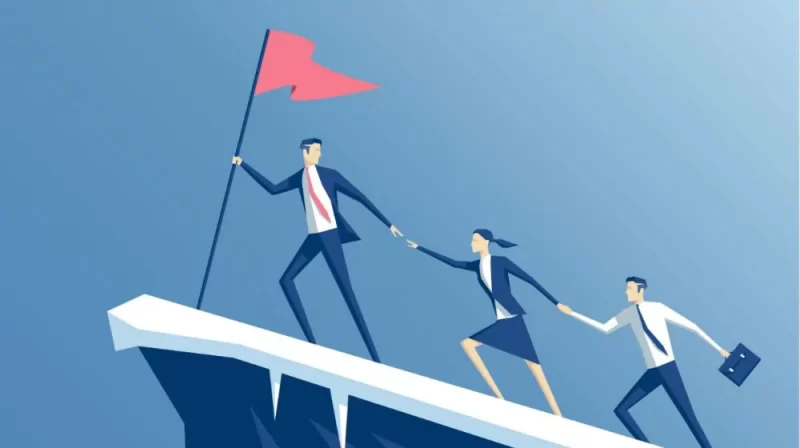The importance of competent leadership in a democratic system is immense. According to Field Marshal Montgomery, the great English soldier, leadership is a person’s desire or ability to assemble men and women to fulfill a common purpose. It is a social quality that is applied to accomplish a joint effort in a coordinated and planned way . For that Leadership skills is the ability and qualities of an individual to influence and manage others and help them achieve their goals. Under the influence of competent leadership, a society can climb up the top of success. On the other hand, The contribution of leadership in all spheres of human life such as state, society, family, mills, offices, courts, and playgrounds is undeniable. Only proper leadership can bring society and the state to the brink of success.
Types of leadership
There are various types of leadership are mentioned below-
- Institutional leader: For example, Chief District Collector of a school or college, President of the country, Factory Manager, etc.
- Authoritative or influential leader: For example, Napoleon, Stalin, Hitler, etc. They have led the team to expand their dominance. They were dictators and rulers of one dictatorship.
- Persuasive leaders: For example, Mahatma Gandhi, Abraham Lincoln, Jahrulal Nehru, etc. They did not lead the party to rule or exercise authority. They persuaded the followers or members to help and follow them.
- Expert Leader: They lead based on experience and skills gained from science, industry, or any other field of work.
- Autocratic leader: He is a strong and powerful person. He imposes authority on others. He became an authoritarian ruler and stay at the center of the party with all the powers. The party could break up at any time without him.
- Democratic leader: Such leaders carry the party through beautiful control. He gives maximum freedom and participates in all kinds of activities. As a senior member, he helps and encourages the party. He is full of high morale and remains at the top of popularity.

Qualities of a great leader
An ideal leader is endowed with many qualities. Since he works as a role model for everyone, he needs to have innumerable qualities. The qualities that an ideal leader needs to have are mentioned below.
Charming personality
A leader must have a charming personality. He has to have a unique image in the quality of leadership. Character traits such as sweetness, flexibility, vigor, eloquence, depth of knowledge, etc., make a leader an ideal personality. Through personality, a leader is able to influence the willpower of others.
Strength and Ability
A leader needs to have sufficient physical and mental strength to help him achieve the most difficult goals.
Knowledge and experience
In order to solve any problem, a person has to have the right knowledge at all times. A leader faces many challenges in managing his affairs. Further, a leader has to play a key role in solving the problems of the country, the nation, or the party. Therefore, it is important for a leader to have sufficient knowledge and experience to solve multi-faceted problems.
Collaborative attitude
A leader has to come forward with an attitude of cooperation towards his subordinates. A cooperative attitude helps the leader in performing his duties. This attitude creates a strong bond between the leader and his subordinates.
Educational qualification
The leader must be educated, highly educated in the field and possess special wisdom. Institutional education helps the leader to acquire leadership skills. For this reason he has to be educated at least in general education. Uneducated people cannot gain the trust and respect of others even if they become leaders due to their strength or circumstances.
Honesty & Justice
The leader is always imitated by his followers. So he has to be just. His character must be good. He needs to be steadfast in the question of principle and justice.
Patience
Losing patience in adverse circumstances can lead to deviation from the goal. For this, the leader has to be very patient and has a fixed heart.
Functions of a Leader
Fixing goals
The leader has to set his own goals in line with the core goals of the organization or team. On the basis of this, he later prepared the process of action and policy.
Preparing organizational structure:
In order to achieve the goal, the leader has to create a system for the distribution of responsibilities, accountability, coordination among departments, etc. Success requires a good organizational structure.
Direction
Whatever the human and non-human resources of the organization, they will not be used properly if there is a lack of guidance. That is why giving direction is an important part of leadership.
Effective co-ordination
One of the tasks of a leader is to employ his subordinates with proper guidance and to achieve his goals through effective supervision. If a leader does not observe the activities of his subordinates then a kind of chaos arises. This breaks down the party structure, which makes the leadership questionable.
Safeguarding Unity
Interest-related factors create rifts in the unity of employees of an organization or party. Maintaining unity among staff and departments is a vital part of leadership.
Influencing behavior
It is normal that the leader will always find out the good and bad of the followers. He will try to alleviate their suffering. Through such activities, the leader can influence the behavior of the employee.
Representing
The leader must represent the interests of his followers. By performing representative work, he brightens the image of the organization or party in the outside world.
Communication
The leader must always communicate with the department, sub-division, branch and staff within the organization or party. He is able to achieve the goals of the organization through effective communication. As a sailor skillfully guides a ship to its destination, a leader guides his followers in the right direction and successfully achieves goals. The leader’s charming personality, manners, etc. attract the followers. So the leader has to perform various tasks with full responsibility.
The main task of a leader is to guide the employees in the right direction to achieve the goals of the party or organization. However, in order to do this, the leader has to pay special attention to protecting the interests of both the organization and the subordinates. Further, leaders have to be tolerant. Leaders with personalities never ignore the people around them. They try to reach the right decision by talking to everyone, discussing, having a dialogue, or going through debates if necessary. They know very well that successful leadership is about listening to everyone and working with understanding.
In the end, just as a boat cannot reach its destination without a skilled sailor, so a party or organization can never succeed without a competent and honest leader.

